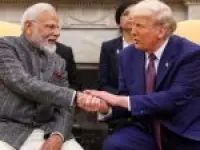
Trump’s Trade War: Canada, Mexico, China Hit Back with Tariffs
US President Donald Trump has announced sweeping tariffs on imports from Canada, Mexico, and China, triggering swift retaliation from America’s top trading partners. The move, aimed at tackling illegal immigration and drug trafficking, has set the stage for a global trade war.
The tariffs, set to take effect on Tuesday, include a 25% duty on most Canadian and Mexican imports and a 10% levy on goods from China. Canadian energy products will face a lower tariff of 10%. Trump invoked the International Emergency Economic Powers Act, citing a national crisis fuelled by fentanyl and illegal border crossings.
“This decision is necessary to hold China, Mexico, and Canada accountable for failing to curb the flow of illegal drugs into the United States,” the White House said in a statement on X. Trump reiterated his stance on Truth Social, saying the tariffs were needed to protect American citizens from deadly substances like fentanyl.
Canada and Mexico Retaliate
Mexican President Claudia Sheinbaum dismissed Trump’s claims that Mexico harbours criminal alliances as “slander.” She called for better cooperation, stating, “Problems are not resolved by imposing tariffs, but by talking.” Sheinbaum instructed her economy minister to introduce countermeasures, including a 25% tariff on US goods.
Canadian Prime Minister Justin Trudeau also vowed to respond forcefully. “We don’t want this, but we will not back down in standing up for Canadians,” he said. Canada plans to impose 25% tariffs on $155bn worth of US goods, with $30bn taking effect on Tuesday and the remainder following within three weeks.
Among the targeted American products are beer, wine, fruit, clothing, household appliances, and furniture. Non-tariff measures, such as restrictions on critical minerals, are also under consideration. Trudeau rejected Trump’s justification for the tariffs, arguing that less than 1% of fentanyl entering the US originates from Canada.
China Condemns US Move
China has strongly criticised the new tariffs, warning of countermeasures and legal action through the World Trade Organization. Beijing’s Commerce Ministry expressed dissatisfaction, urging the US to handle fentanyl-related issues with a “rational and objective” approach. Vice-Premier Ding Xuexiang had previously signalled China’s willingness to resolve trade tensions through negotiations.
Economic Fallout and Industry Backlash
The US, Canada, and Mexico share a deeply integrated economy, with approximately $2bn worth of goods crossing borders daily. Economists warn the tariffs could drive up costs for consumers and businesses, particularly in the auto sector. TD Economics estimates the price of an average US vehicle could rise by $3,000 due to the new levies.
Industry groups in the US have also raised concerns. The National Homebuilders Association warned that tariffs on lumber and steel could make housing more expensive. Farmers for Free Trade said American farmers, already struggling with market pressures, would face further hardships. The US Retail Industry Leaders Association, representing major chains like Target and Walgreens, has urged a diplomatic resolution to avoid supply chain disruptions.
The Canadian Chamber of Commerce echoed these concerns, stating that the tariffs would have “immediate and direct consequences on Canadian and American livelihoods.” Meanwhile, Nova Scotia’s Premier Tim Houston has ordered the removal of all US alcohol from provincial store shelves in protest.
Political Ramifications and Market Impact
The tariff dispute has sent shockwaves through financial markets. The Mexican peso and Canadian dollar dropped in value following Trump’s announcement, while US stocks also saw declines. Bond yields rose as investors reacted to the potential economic slowdown.
Trump’s latest move is in line with his long-standing trade policies, despite warnings from economists that increased tariffs could trigger a recession. Republican allies have praised the action, seeing it as a fulfilment of Trump’s election promises. However, Democratic lawmakers have accused Trump of abusing executive powers, calling for legal scrutiny of his emergency declaration.
Trade lawyers predict potential legal challenges to the tariffs, particularly given the sweeping nature of Trump’s executive orders. Critics argue that the measures could backfire, harming American businesses and consumers while failing to achieve the administration’s policy objectives.













